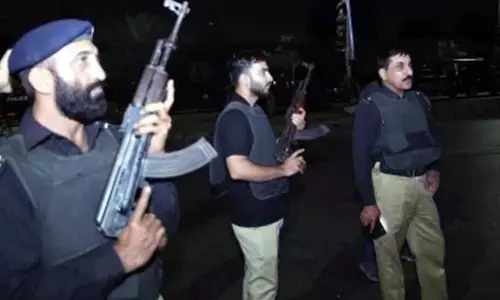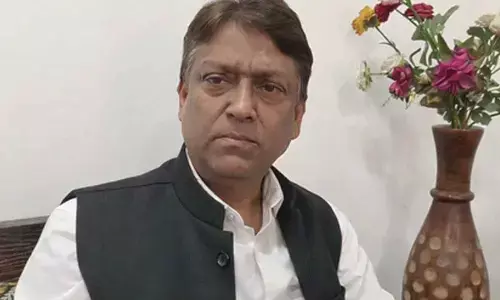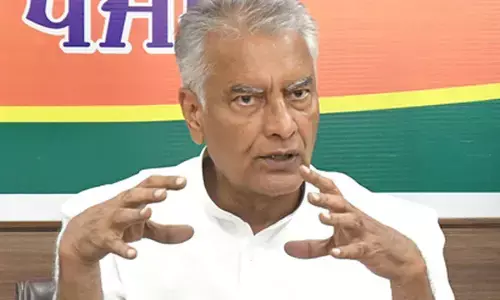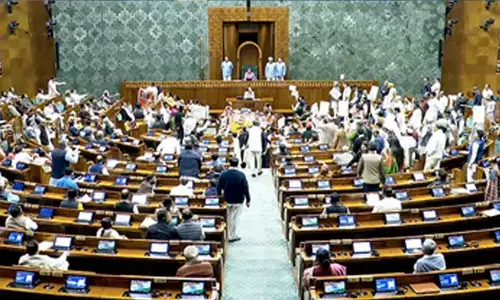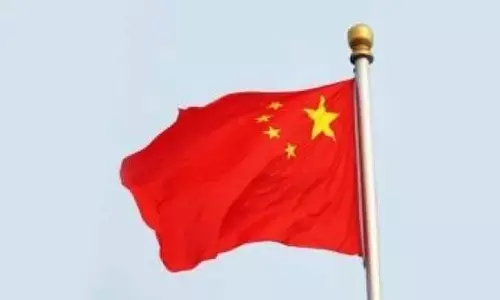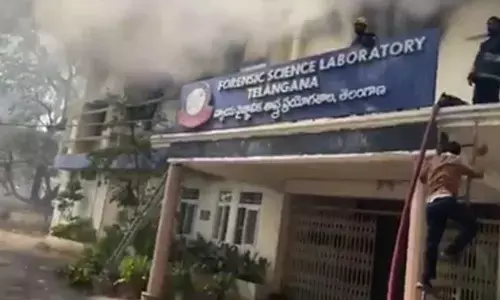Pak’s nefarious plan obvious in Khalistan’s revival
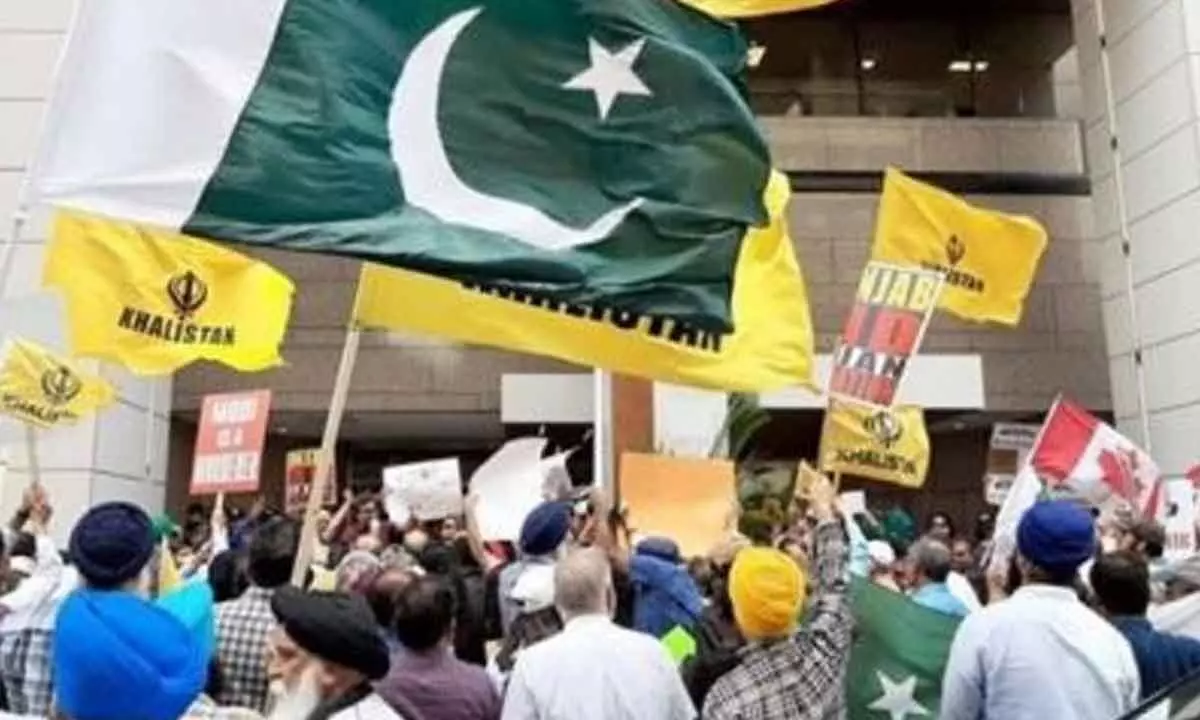
Slowly but steadily the Pak-supported Khalistan movement is raising its head among the Sikh diaspora in the four countries -- Canada, Australia, the US and the UK -- where it is significant number-wise.
There is an upswing in this activity since 2022, evidently under external instigation as the call for a ‘referendum’ on Khalistan was given by elements known to be in cohort with Pak ISI.
Khalistanis abroad are taking to violence in a manner that was designed to produce consequences in India - particularly in Punjab.
Vandalism against India’s diplomatic Missions abroad, defacing of temples and glorifying past incidents pertaining to Khalistan terror in India, have been resorted to in a planned way for this purpose.
In an event that marked a point of sharp escalation on the graph of this violence, the Indian Consulate in San Francisco, US was set on fire in July 2023 by a group of Khalistan separatists belonging to the newly established ‘Sikhs for Justice’. This organisation put up posters calling for the ‘killing’ of India’s top diplomats posted in Canada, the US, the UK and Australia - this was in response to the murder of Hardeep Singh Nijjar, a wanted terrorist killed in British Columbia, Canada by masked gunmen in June 2023.
Khalistan separatists in Brampton, Canada took out a 5-km-long parade on June 4, 2023, in which a float displayed the assassination of Prime Minister Indira Gandhi by Khalistan loyalists.
The ‘Sikhs for Justice’ conducted a ‘referendum’ for a separate Khalistan, in Canada, the US, the UK and Australia in 2022. In Canada, one crore Sikhs out of a total of eight crores took part in it which was not insignificant. In Australia, the event was organised at Federation Square Melbourne in January 2023 and it led to a clash between Khalistanis and pro-India supporters.
In an early incident of communal violence, Khalistan and India supporters -- numbering 400-500 -- clashed in Mississauga Ontario, Canada on the eve of Diwali in October 2022. While Canada witnessed several incidents of defacing of temples, events also occurred in January 2023 in Australia in which three major temples were defiled by way of painting of anti-India slogans on their walls. In February 2023, the Indian Consulate in Brisbane, Australia was targeted by pro-Khalistan separatists who installed a Khalistan flag on its premises.
On March 19, 2023, a group of Khalistan activists in an auditions act, vandalised the Indian High Commission in London, took out the Indian flag, and tried to install a Khalistan flag there.
Indian Intelligence found that there was infiltration of Khalistan protagonists in the farmer’s agitation of 2020 and Amritpal Singh, a known advocate of Khalistan and promoter of the Bhindranwale cult, came to India from Dubai and visited sites of protesting farmers.
On January 26, 2021, farmers instigated by Khalistan elements entered Red Fort in Delhi and hoisted the Nishan Sahib flag there. The ‘Sikhs for Justice’ announced a reward of Rs 2.5 crores for unfurling the Khalistan flag at the Indian Parliament.
In February 2023, Amritpal Singh along with thousands of his supporters some of them armed and also carrying Guru Granth Sahib, raided Ajnala Police Station near Amritsar and secured the release of Lovepreet Singh Toofan, an aide of Amritpal Singh who had been earlier arrested for violence.
Amritpal Singh who had in the meanwhile visited village Rode in Moga district - the birthplace of Jarnail Singh Bhindranwale - as part of his plan to imitate Bhindranwale and spread the ideas of the founder of the Khalistan movement, was arrested in April 2023.
It may be recalled that Canada had in 1980 provided sanctuary to dreaded Khalistan terrorists like Jagjeet Singh Chauhan and Talwinder Singh Parmar. Designated terrorist Arshdeep Singh Gill of Khalistan Tiger Force is also sheltered in Canada.
The threat of Khalistan terror has in a major way originated and sustained by Canada since Prime Minister Trudeau had been politically dependent on the support of the Sikh separatists there.
On March 2023, Indian High Commission had to cancel an event in British Columbia, Canada as some 200 Khalistanis - some with swords - gathered before the venue to protest against the arrest of Amritpal Singh in India.
Over these last two years, the activities of Khalistan separatists have gathered pace both in countries like Canada, Australia, the US and the UK as well as in India, clearly indicating the desperation of Pakistan about reviving the terror profile of the Eighties in the border state of Punjab.
The prolonged spell of Khalistan terror in Punjab in the 1980s was broken by a highly successful Operation Black Thunder in 1988 after which the violence had tapered off there. This had compelled Pakistan to launch a new phase of militant separatism in Kashmir in the name of Jehad - in replacement of the slogans of Plebiscite and Aazadi - in what came to be known as the K2 plan of the ISI.
Pakistan is replicating the modus operandi that had been successfully used by it in Punjab in the 1980s - reflected in the three-fold strategy of pressing into the use of locally fabricated IEDs like a ‘cycle bomb’ to create an atmosphere of fear, spreading ‘Amritdhari’ movement through Gurdwaras and precipitating the communal divide in the state by instigating violence against Hindus - resulting in cases of massacre of Hindu passengers travelling by bus.
Attacks on our diplomatic missions and cases of vandalisation of temples abroad are aimed at injecting an atmosphere of communal divide in Punjab. This time around, however, Hindu-Sikh unity in Punjab against any return of terrorist violence there has proved to be the biggest obstacle in the path of the adversary. Nonetheless, the spread of the ‘Amritdhari’ cult is going on particularly in the sensitive border districts of the state through selected Gurdwaras for the purpose of raising potential militants. Communal division if instigated in a sustained way - in a state where there is a history of religion being mixed with politics - can grow how so ever slowly.
The learning for policymakers and the national security set-up is that an all-out effort has to be made to nip the trouble in the bud, in Punjab.
Diplomatic, political and police measures have to be put in place to stop in time any further deterioration of the situation in Punjab.
India has already stepped up its diplomatic offensive to warn countries like Canada, Australia and even the UK not to allow militant anti-India activities of Khalistan separatists on the tenuous plea of freedom of expression and named Canada for inaction on account of considerations of ‘vote bank’ politics.
India has to counter the pro-Pak lobbies active internationally and supported by China in pursuance of the Sino-Pak axis that had become particularly strong after the take-over of Kashmir by the Centre here.
There is a possibility of Islamic militancy and Khalistan separatism working together.
The present state government in Punjab has to rise above any approach of political ambiguity while handling the emerging problem and become aware of the dire need for keeping politics above issues of national security. Unity of Punjabis rooted in the common belief in the values taught by Guru Nanak has to be preserved and promoted.
It is advisable to consider putting Punjab under a Governor with national security background to suitably guide the state and educate the state government on the developing situation. A civilian who had direct knowledge of the way terrorism had grown in Punjab in the ‘80s and who was adept at dealing with the Army on a note of mutual respect, should fill the bill.
Punjab needs mature handling in liaison with the national security set-up and calls for a smooth Centre-State relationship for advancing the larger interest of the state and the nation.
China and Pakistan are working in collaboration to exploit whatever opportunities they had for fishing in the troubled waters here.
Apart from the faith-based terrorism Pak ISI could foment in India taking advantage of communal discords that this country remained prone to, the Sino-Pak axis could be working to create further problems in Kashmir, Punjab and the North East through clandestine funding, weapon supply and dropping of narcotics using drones. This is already happening on a significant scale adding a new dimension to the proxy war India was facing for years. It is in this context that Punjab needs urgent attention and steps directed at countering the threat of Khalistan militancy that was evidently raising its head there.
(The writer is a former Director of the Intelligence Bureau. Views expressed are personal)








